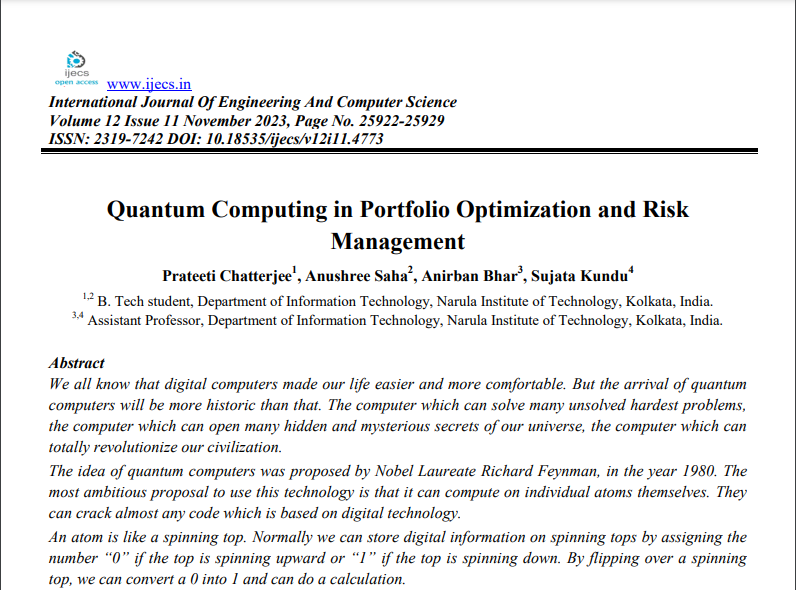Quantum Computing in Portfolio Optimization and Risk Management
Authors
Abstract
We all know that digital computers made our life easier and more comfortable. But the arrival of quantum computers will be more historic than that. The computer which can solve many unsolved hardest problems, the computer which can open many hidden and mysterious secrets of our universe, the computer which can totally revolutionize our civilization.
The idea of quantum computers was proposed by Nobel Laureate Richard Feynman, in the year 1980. The most ambitious proposal to use this technology is that it can compute on individual atoms themselves. They can crack almost any code which is based on digital technology.
An atom is like a spinning top. Normally we can store digital information on spinning tops by assigning the number “0” if the top is spinning upward or “1” if the top is spinning down. By flipping over a spinning top, we can convert a 0 into 1 and can do a calculation.
But in the quantum world an atom can stay in both (i.e spinning up and down).This is called superposition. So, there's a lot more data that one atom may hold than just a zero or a one. The description can include both zeros and ones. Consequently, quantum computers rely on "qubits" instead of bits. In this way, a spinning atom can store vastly more information than a single bit. If we factorize an integer of 100 digits in a digital computer it might take a century to factorize it. But a quantum computer is so powerful that it can crack such code in just a few seconds.
But the question is what makes a quantum computer so powerful. The answer is quantum superposition. One qubit can describe the state of multiple classical bits, i.e. N qubits can describe the state of 2^N classical bits. Therefore, why aren't quantum computers available to us? The problem is de coherence which is the single most difficult barrier to creating quantum computers.
When atoms are coherent and vibrating in phase with one another, the tiniest disturbances from the outside world can ruin this delicate balance and make the atoms decoherent. Even the passing of a cosmic ray or the rumble of a truck outside world can destroy the delicate spinning alignment of these atoms and destroy the computation. So, we must make it isolated from the outside world. To present the superposition or avoid the decoherence problem, extreme cooling is needed. But many experts have predicted that by 2050 we may have found ways to achieve room temperature quantum computers.
Article Details
Published
Issue
Section
License

This work is licensed under a Creative Commons Attribution-NonCommercial-ShareAlike 4.0 International License.


